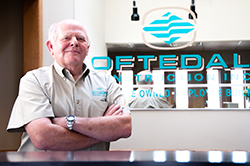MSU Billings College of Business

MSU Billings' Inaugural Hall of Fame Class of 2014
 Bill Oftedal has an extensive background in building businesses from the ground up.
Bill Oftedal has an extensive background in building businesses from the ground up.
Fifty years ago, Oftedal and his father, Ed, saw the emerging need for excavation, reclamation and road construction in Montana.
In 1956, President Dwight D. Eisenhower signed the Federal-Aid Highway Act into law, establishing the Interstate highway system and providing significant funding to states to complete the system by 1972.
Two years later, the Highway Commission contracts the first Montana Interstate project—five miles of Interstate 15 between Monida and Lima.
By 1964—the year E.H. Oftedal and Sons was founded—construction of Interstate 90 over Homestake Pass began. When completed in 1966, the total cost of the Interstate between Whitehall and Butte was $18.5 million.
With a tractor and a scraper, the small earthmoving company was in business. Oftedal’s brother, Jim, soon joined the venture and the boys’ mother, Dede, was put in charge of the books.
“It’s a typical American story, with people just trying to get ahead,” Oftedal said.
By the 70s, the family owned and operated business based in Miles City expanded into Wyoming with mine reclamation projects, eventually setting up a second shop in Casper.
By 1985, Oftedal assumed the role of the company’s president and Jim as Vice President.
Today, Oftedal Construction is one of the largest earthmoving contractors in the Northwest region. The company was ranked 66 in the nation in the Top 200 Federal Highway Contractors list published in 2002 by Transportation Builder.
Best known for mass excavation of earth and rock, Oftedal Construction also specializes in highway and road construction site preparation, mine reclamation and dam and dike construction.
Much of the company’s work, Oftedal said, is to be stewards of the land.
“It’s always been our mission to ensure present and future generations will continue to have clean air and clean water, so we are cautious to protect the environment within our operations,” Oftedal said.
Also a steward of his employees, Oftedal credits the success of his company to the people who worked for him, many of which worked for Oftedal for more than 30 years.
“We didn’t create the company, our employees did,” he said. “They were the ones in the trenches.”
When the brothers reached retirement age in 2008, rather than selling the business outright, they transferred ownership to its 250 employees through an employee stock option.
“Our employees had always gone over-and-beyond for the company,” Oftedal said. “It was extremely important to us that we could provide them with work until they retire too.”
Thirty-year employee Lynn Ruf said she was very thankful the company was left in the hands of employees.
“Bill and Jim, they built the company, but they felt strongly that the employees built the company along with them,” Ruf said. “They wanted us to benefit too.”
